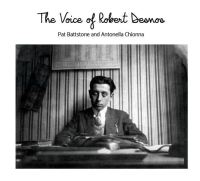by J. Pepper
Pianist Pat Battstone declares in his liner notes that, “From the moment I read Robert Desnos, I realized he was writing with the same process as musical improvisations. As I read his life and that of those around him during his creative period, the more I was convinced of this. The creative processes of self-abandon, trance, automatic actions and spontaneity are means by which the artist transcends the “reality” of the six walls that surround us and peers, into a new but deeper vision of a sur-reality; one where the “movie screen” that we are all viewing suddenly melts and we are left staring at that which was behind our illusory conception.” Battstone and Antonella Chionna team up to bring us music and Desnos’ poetry, combined in an improvisatory setting, the CD is titled: The Voice of Robert Desnos.
Battstone suggests The Voice of Robert Desnos was a work in progress for many years in his mind, but until he meet Chionna, the opportunity to relive his vison had not presented itself. In many ways, the music on this recording is representative of a steam-of-consciousness narrative. On “Wifeless, Plump Buck Moonigan” Chionna’s ability as a multi-talented musician shines, as she accompanies herself with endless invention and creativity, singing long held notes and making vocal effects and rhythms, as she recites the poem. Her vocal control is evident and impressive, her pitch is controlled and her ideas are clear. One can tell that Chionna is totally in the moment.
Ba ttstone is a pianist that has talents in written compositions and free improvisational playing, in both group and solo settings. His playing bursts with capacity; classically-trained, seduced by jazz, the two worlds offer boundless originality. In many ways, everything Battstone plays is full of transcendent journeys through musical inventions. It is hardly surprising that Battstone and Chionna when performing a standard, will present a rendition that offers special originality. Such is the case with “Nature Boy,” beginning with Chionna singing the melody A cappella, she is able to relate to all of the topography and inventions of all the poems on the project and ties this classic standard into the theme of the album, along with Battstone. However, the most beautiful part of this duet is Battstone’s ability to listen and play supportive, colorful figures around Chionna’s singing, this is refreshing, as many duet recordings the accompanist can try to fill all the gaps versus breathing together and creating a “group,” sound with beautiful spaces. This track is an amazing example of what a vocalist can do with a standard when they know their accompanist can follow anything. This is true freedom in the moment and the result is stunning.
ttstone is a pianist that has talents in written compositions and free improvisational playing, in both group and solo settings. His playing bursts with capacity; classically-trained, seduced by jazz, the two worlds offer boundless originality. In many ways, everything Battstone plays is full of transcendent journeys through musical inventions. It is hardly surprising that Battstone and Chionna when performing a standard, will present a rendition that offers special originality. Such is the case with “Nature Boy,” beginning with Chionna singing the melody A cappella, she is able to relate to all of the topography and inventions of all the poems on the project and ties this classic standard into the theme of the album, along with Battstone. However, the most beautiful part of this duet is Battstone’s ability to listen and play supportive, colorful figures around Chionna’s singing, this is refreshing, as many duet recordings the accompanist can try to fill all the gaps versus breathing together and creating a “group,” sound with beautiful spaces. This track is an amazing example of what a vocalist can do with a standard when they know their accompanist can follow anything. This is true freedom in the moment and the result is stunning.
This is a cleverly constructed project that may not be completely vocally oriented, but the parts that are, suggest a palpable deeply-felt connection that can form when the vocalist is confident in the abilities of the accompanist. The two naturally display extraordinary musical talents that will inspire and make the listener think and hear outside of the box. Well done!


You must be logged in to post a comment.